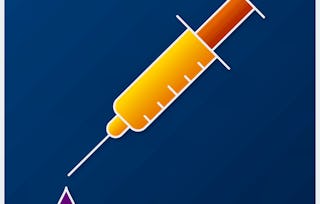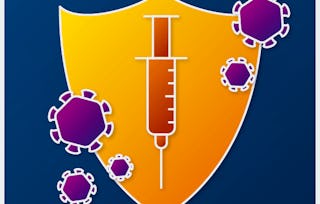This course explores the different types of vaccine available. This is a useful framework for understanding the scientific understanding that went into vaccine development. It also gives a perspective of how innovation (e.g. fundamental virology, molecular biology) work in a translational medicine context.

Types of Vaccine
Ends soon: Gain next-level skills with Coursera Plus for $199 (regularly $399). Save now.

Types of Vaccine
This course is part of Foundations in Virology and Vaccinology Specialization

Instructor: John Tregoning
2,622 already enrolled
Included with
(31 reviews)
Recommended experience
What you'll learn
Recognise how viruses cause infections
Recognise how vaccines prevent infections
Skills you'll gain
Details to know

Add to your LinkedIn profile
4 assignments
See how employees at top companies are mastering in-demand skills

Build your subject-matter expertise
- Learn new concepts from industry experts
- Gain a foundational understanding of a subject or tool
- Develop job-relevant skills with hands-on projects
- Earn a shareable career certificate

There are 4 modules in this course
First, we will look at the very first vaccines and how they shaped the future of the field. This shows how vaccine development closely follows developments in other scientific fields. The early history of microbiology and vaccinology are closely tied. The founders of one field often worked in another – for example Louis Pasteur and Robert Koch. Their approaches centred on the whole pathogen. Early vaccines were made with an understanding of infection biology, but not so much about the immune response to these pathogens. We will focus in on the range of methods used to develop vaccines, many of which are still used in vaccine development today.
What's included
6 videos7 readings1 assignment2 discussion prompts
Here we will look at protein and sugar-based vaccines. We will start by looking at how these vaccines provide protection. We will then investigate how novel biotechnology techniques have helped in the development of new vaccines, before looking at how sugars can be targeted and the impact this has had. Finally, we will explore how advances in immunological understanding are helping to shape the next generation of vaccines.
What's included
5 videos3 readings1 assignment4 discussion prompts
Here we will explore how instead of targeting individual parts of a pathogen, we can take weaker forms of a pathogen and use it to make a vaccine. We will look at the original vaccines that were developed by this approach, then more broadly at how the immune system provides protection at two sites of infection – the airways and the guts. Finally, we will look at two viral pathogens, polio and influenza, and the past, present and future of vaccines for them.
What's included
5 videos3 readings1 assignment2 discussion prompts
Finally, we will look at how vaccines can be used to prevent and contain pandemics. We will start with a history of the use of vaccines in pandemics and the special requirements. We will then look at two of the new platforms that were successful during the COVID-19 pandemic, RNA and viral vectors.
What's included
6 videos4 readings1 assignment3 discussion prompts
Earn a career certificate
Add this credential to your LinkedIn profile, resume, or CV. Share it on social media and in your performance review.
Instructor

Offered by
Explore more from Basic Science
 Status: Free Trial
Status: Free TrialImperial College London
 Status: Free Trial
Status: Free TrialImperial College London
 Status: Preview
Status: PreviewThe George Washington University
 Status: Preview
Status: PreviewJohns Hopkins University
Why people choose Coursera for their career




Learner reviews
31 reviews
- 5 stars
93.54%
- 4 stars
6.45%
- 3 stars
0%
- 2 stars
0%
- 1 star
0%
Showing 3 of 31
Reviewed on Jan 15, 2025
Good methodology, that helped me clarify many concepts, including those regarding vaccine preventable diseases.

Open new doors with Coursera Plus
Unlimited access to 10,000+ world-class courses, hands-on projects, and job-ready certificate programs - all included in your subscription
Advance your career with an online degree
Earn a degree from world-class universities - 100% online
Join over 3,400 global companies that choose Coursera for Business
Upskill your employees to excel in the digital economy
Frequently asked questions
To access the course materials, assignments and to earn a Certificate, you will need to purchase the Certificate experience when you enroll in a course. You can try a Free Trial instead, or apply for Financial Aid. The course may offer 'Full Course, No Certificate' instead. This option lets you see all course materials, submit required assessments, and get a final grade. This also means that you will not be able to purchase a Certificate experience.
When you enroll in the course, you get access to all of the courses in the Specialization, and you earn a certificate when you complete the work. Your electronic Certificate will be added to your Accomplishments page - from there, you can print your Certificate or add it to your LinkedIn profile.
Yes. In select learning programs, you can apply for financial aid or a scholarship if you can’t afford the enrollment fee. If fin aid or scholarship is available for your learning program selection, you’ll find a link to apply on the description page.
More questions
Financial aid available,

